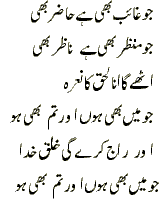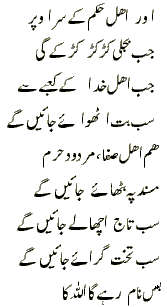 Adil Najam
Adil Najam
The very first blogpost on ATP was the video tribute to Pakistan I had made using Faiz Ahmed Faiz’s classic poem ‘hum daikhain gay...’ This was not just blatant self-projection — although it was that too. It was an expression of my hopes and concerns, an acknowledgement of my gratitude to Faiz’s poetry, and in many ways a ‘statement of purpose’ for this blog.
 A number of people have asked me to post an English translation of the poem ‘hum daikhain gay...’ There are, of course, many available translations of this classic work. But I wanted to share a new one with you. This is by Maniza Naqvi and I find this particularly powerful because it is simple and true to the original words and yet is able to also convey the intensity of poem’s intent. Translating poetry is never easy. Here is a good example of how it should be done.
A number of people have asked me to post an English translation of the poem ‘hum daikhain gay...’ There are, of course, many available translations of this classic work. But I wanted to share a new one with you. This is by Maniza Naqvi and I find this particularly powerful because it is simple and true to the original words and yet is able to also convey the intensity of poem’s intent. Translating poetry is never easy. Here is a good example of how it should be done.



We shall see/certainly we, too, will see/
that day that has been promised us
When these high mountains
Of tyranny and oppression/ turn to fluff
And evaporate
And we oppressed
Beneath our feet will have
this earth shiver, shake and beat
And heads of rulers will be struck
With crackling lightening and
thunders roar.
When from this God’s earth’s (Kaa’ba)
All falseness (icons) will be removed
Then we, of clean hearts–condemned by zealots those keepers of faith,
We, will be invited to that altar to sit and Govern–
When crowns will be thrown off–and over turned will be thrones
We shall see/certainly we, too, will see
that day that has been promised us
Then God’s name will remain (Allah will remain)
Who is invisible and visible too
Who is the seer and and is seen
Then will rise one cheer———I am God!
Who I am too
And so are you
Then the masses (Khalq e Kuda) people of God will rule.
Who I am too
and so are you
Then will rise one cheer———I am God!
Who I am too
And so are you
(Translation by Maniza Naqvi)
 You will find much written on Maniza on the web–for example, here, here and here. She works at the World Bank, lives in Washington, DC, and is an active intellectual whose works include (apart from others) ‘Mass Transit‘ (a novel based in Karachi about the emotional consequences of mass migration and “an immigrant population which never really assimilates”) and ‘On Air‘ (another novel where the plot unfolds over a six-hour period in which the main character,
You will find much written on Maniza on the web–for example, here, here and here. She works at the World Bank, lives in Washington, DC, and is an active intellectual whose works include (apart from others) ‘Mass Transit‘ (a novel based in Karachi about the emotional consequences of mass migration and “an immigrant population which never really assimilates”) and ‘On Air‘ (another novel where the plot unfolds over a six-hour period in which the main character,  Naz, tells stories to listeners and callers over the radio on a late night talk show slot that she has been offered to fill for just one night).
Naz, tells stories to listeners and callers over the radio on a late night talk show slot that she has been offered to fill for just one night).
In reviewing ‘On Air’, Asif Farrukhi, writes:
Post-nuclear Pakistan is a medley of voices–the enigmatic female host of a phone-in talk show discovers as opinions abound, pizza, hijab, recipes which are a part of culture and not sectarianism, come together in a compelling narrative… A welcome addition to the stunted list of Pakistan’s writers in English, Maniza Naqvi is a name to look out for.



















































Hi,
I am translating Faiz from Urdu to Farsi. I need someone who is urdu/english speaker and has good knowledge of Faiz’s poetry to help me. Will it be possible if Maniza Naqvi help me for that purpose? I would be grateful if you send me her email address or pass my email address to her.
Regards
Bashir Sakhawarz
[…] […]
Here is a transliteration as well as translation I found of the web. Enjoy.
Hum Dekhain Gay
We shall see
Lazim Hai ke hum Bhi Dekhain Gay
It is necessary that we shall also see
Woh Din ke Jis ka Wadah Hai
That day which has been promised
Jo Loh-e-Azl pe Likha hai
Which is written with God’s ink
Hum Dekhain Gay
We shall see
Jab Zulm-o-Sitam ke Koh-e-garaan
When the mountains of cruelty and torture
Ruii ki Tarah Urd Jain Gay
Will fly like pieces of cotton
Hum Mehkumoon ke Paun Talay
Under the feet of the governed
Yeh Dharti Dhard Dhard Dhardkay gi
This earth will quake
Aur Ehl-e-Hukum ke Sar Uper
And over the head of the ruler
Jab Bijli kard Kard Kardke gi
When lightening will thunder
Hum Dekhain Gay
We shall see
Jab Arz-e-Khuda ke kabay se
When from God’s Mecca
Sab but Uthwaaiy Jain gay
All the idols will be shattered
Hum Ehl-e-Safa Mardood-e-Haram
Us people standing in the mosque
Masnad pe Bithaaiy jain gay
Will be elevated to a higher platform
Sab Taaj Uchalay jain gay
All the crowns will be tossed
Sab Takht Giraaiy Jain gay
All the thrones will be toppled
Bas Naam rahay Ga Allah ka
Then only God’s name will remain
Jo Ghayab Bhi hai Hazir Bhi
Who is both absent and present
Jo nazir bhi hai manzar bhi
Who is both the observer and the view itself
Uthay ga Analhaq ka Naara
When the anthem of truth will be raised
Jo Main bhi Hun aur Tumbhi ho
Who I am and you are as well
Aur Raaj karay gi khalq-e-Khuda
And the people of God will reign
Jo main bhi hun aur tum bhi ho
Who I am and you are as well
Hum Dekhain Gay
We shall see
Lazim Hai ke hum Bhi Dekhain Gay
It is necessary that we shall also see
Hum Dekhain Gay
We shall see
Can someone post or point me to a transliteration or even better an rendition audio of this poem? As someone who knows Hindi and has familiarity with Urdu, but cannot read it, I can’t enjoy the original poetry. And I’d like to.
“It is in the nature of man to like what he is familiar with and in which he has been brought up, and that he fears anything alien. The plurality of religions an their mutual intolerance result from the fact that people remain faithful to the education they received.”
A snippet from The Guide for the Perplexed.